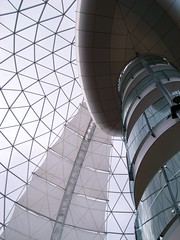
(PAW2009 04/52)
In the six or so years I lived in Scotland, the centre of Belfast changed — and not only in that I forgot my way around. The change continues.
The dome of Victoria Square is a very visible symbol of what’s happening. Under it there are many shops of a kind Belfast never expected to see, charging prices that not much of the city is used to. On one level this is, of course, good for the city; it certainly seems to be helping the city’s image.
Yet under the dome there are still plenty of empty units, and at least one that has been vacated as a result of the recent economic mess. The covered streets of Victoria Square still seem quiet during the day, as if they expected a bigger crowd than Belfast has been able to provide.
The building itself, though, is spectacular. I’m a student of neither architecture nor engineering, but I know the feeling of walking round a building and being impressed. I can still stand and look around me, mouth hanging open.
It’s one kind of expression of one kind of hope, a statement from a city that’s still trying to drag itself out of history. Other developments seem focused on reaching as high as possible, while others are trying to do something quite different. What is it about building that we focus on? Buildings are attractive, seductive, monumental, exciting, inspiring and eloquent — how we build and occupy area and space can reveal much about what we value and where we want to go.
In the past, the biggest and grandest were for government and worship; then there were the museums and galleries; today we build shopping centres and multiplexes. What will be next?
It’ll always be a complicated proposition for an Englishman to make a film about India, perhaps more so if the film spends much of its time in and around the slums of Mumbai, but Danny Boyle has rarely gone for an easy film.
Like most of his films, Slumdog Millionaire is disconcertingly wonderful to look at. While I’ve never been to India, my wife tells me that the high-contrast, saturated colours and constant movement, coupled with AR Rahman’s brilliant soundtrack, provide a right sense of the place. The intense imagery complements well the fairytale story.
It’s a strange mix. (Or not. Fairytales can be pretty gruesome.) Rags-to-riches and love-across-the-years, taking in an episode of Who Wants To Be A Millionaire?, humour, abuse, violence, torture, and a flash of full-on Bollywood dance. Everything about the movie is efficiently eloquent: visuals, dialogue and performance. I don’t expect to see a much better film in 2009.
The writer, Simon Beaufoy, set out to capture the resilience and joy he witnessed in the slums, and it’s all there. I’ll have to take his word for it as an accurate portrayal, but it seems honest. There’s no danger of romanticism; instead, he manages to make the characters and situation more than a two-dimensional backdrop. It’s good to be reminded that a full humanity exists on the other side of the screen, even in the slum. Those scenes could so easily have been patronising nonsense. (Of course, I’m a white man in Northern Ireland. They still may be.)
As my wife and I walked out of the cinema, the people around us were talking about some of the predictable resolution and the cheerfulness of parts of the film. We talked a little about how the tone of the film was, on balance, more upbeat that not. Often when a film deals with poverty and deprivation it becomes very worthy. Slumdog doesn’t, remembering instead that it is, after all, a fairytale for our entertainment. If the laughter, romance and joy are wrapped around a little bit of something to make us think — if they help us to entertain images of global need — then that sounds good to me.
I thought carefully about that title. It’s not hyperbole. As I wrote after the election last November, the leadership of the USA has influence around the globe, especially in Western Europe. So, yeah, I think the world has changed.
(It happens every day. It certainly happened on 20th January 2001, and it happened on 20th January 2009.)
I thought about pulling a few words from the new President’s inaugural address, but I’d have ended up copying and pasting most of it. You’ve probably read it or listened to it by now, but if you haven’t then you really should.
Of course, words are easy. The ability to move and inspire with words has never been a guarantee of any form of goodness. And yet, even with an Ulsterman’s cynicism, Mr Obama’s words give me hope. I may be on the other side of the Atlantic, and I may never have visited the States, but I was glad yesterday.
No man, no government, is perfect. At some point in the next four (or eight) years, each person currently celebrating will be disappointed. That’s okay. It’s not a criticism of Barack Obama. It’s a truth we can be sure he’s aware of, and one the rest of the world had best remember. At every decision to be made, someone will disagree. Sometimes doing what’s right will mean upsetting a great many people. That’s part of government’s job. It needn’t banish hope.
I’ve no idea how the next days, weeks, months, years will shake out, but yesterday I was glad, and today I hope.
In a few hours, the Free World will have a new Leader. Or something like that.
November seems a long time ago, and since then there have been some mutterings, although how fair it is to criticize the man for his handling of a job that he hasn’t started yet, I don’t know.
On this side of the Atlantic, I know a few folks who will be glued to their TV screens/internets today, enjoying the ceremony and pageantry. I probably would be if it weren’t for the whole work thing.
There has been and will be plenty of talk about what an Obama presidency will mean for this little corner of the world. While Mr Obama and friends will have many weighty decisions to make and consequences to face, VM offers a reminder of the very local nature of working politics:
Just as I believe that we didn't need a Northern Irish Mandela and De Klerk ten years ago, I don't believe we need a Northern Irish Obama now. But we DO need a clearly articulated vision for a new Northern Ireland and someone to articulate it... And people prepared to give that someone the political cover to do so...
For that to happen we will need to learn one thing from the new USA: hope and faith that politicians can accomplish good. May it be so.

(PAW2009 03/52)
I spent a couple of days in Portrush last week, having organised a retreat for a small crowd of community work folks. One of the nice things about the organising is the chance to get someone else to do much of the facilitation.
The company was good, the hotel pleasant with great food, the weather wasn’t uniformly horrible and I managed to grab a few minutes to go walkabout with a camera, even if it was after dark. Also, I learned a few things:
- Coffee is serious business, taken seriously by some, and it's best to not get between them and it.
- The warm, brown liquid served by the hotel during breaks was, apparently, not coffee.
- Spare spectacles aren't much help if they're sixty-odd miles away.
- I'm short-sighted enough that going without my glasses leads to a discomfiting disconnect from what's going on in the room.
Why Portrush in January? In the summer it’s pretty horrible, but in the winter there is a slightly deserted peace to the town that I’m fond of, and since I was picking the venue, that’s where we went. I can’t help but think, though, that it’d be harder to enjoy the ghost-town feel if you live there.

